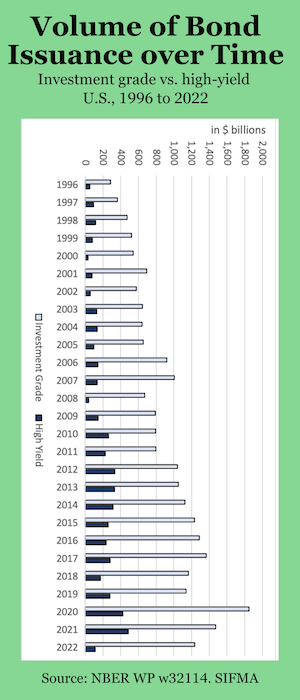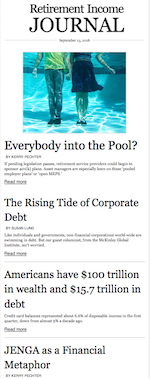
Francois Gadenne, the president of the Retirement Income Industry Association, announced this week that the organization is going to end its 10-year run as the leading client-centric organization in the $26 trillion retirement space by selling its RMA professional designation to the Investment and Wealth Institute—the professional organization formerly known as IMCA.
“I was talking to my partner Al Turco at our 10-year gala and we decided that we had succeeded in creating the best designation in retirement income planning, one that started with clients and not products,” said Gadenne, who was born in Lille, France, educated in France and at Northwestern’s Kellogg School of Management in Chicago and made his fortune at the end of the 1990s by selling a dot-com robo-advisor, Rational Investors, Inc., to Standard & Poor’s.
“But in terms of getting our designation on the approved list of all the major distribution companies, we were only doing onesies and twosies and knew it would be a long and tough slog,” he told RIJ yesterday. “So we asked ourselves, ‘Who would be the best choice for a partner if we were going to do a joint venture?’ We made a strategic map and IMCA—now the Investment and Wealth Institute—was the first choice.
“They had reached out to me early last year and asked me to speak at their annual conference in May. I called their CEO, Sean Walters, and said ‘You’re first on our list.’ After a 90-minute conversation, we clicked and it just happened. The Institute is big enough to survive in a cartelized industry, and small enough to grow a lot. They were first on our list because we have a client-focus and so do they.”
RIIA was set up as a 501(c)(6) non-profit, and it owned the intellectual property rights to the RMA, the professional certification that was based on the philosophy that all retirement advice starts with a consideration of the client’s entire “household balance sheet”—i.e., all of the clients’ assets and liabilities, including human capital, social capital and real estate holdings—and ends with a solution that provides the client with a floor income plus exposure to upside growth during retirement.
With the transfer of the rights to the RMA, it will become one of the Institute’s constellation of designations for advisors, which include the Certified Investment Management Analyst and the Certified Private Wealth Advisor. The RMA will become a two-tier program, offering a “light” certificate program for advisors who complete a distance-learning course and a full-blown professional designation for those who complete a more rigorous course.
The Institute has educational partnerships with professors at The Wharton School, Yale and the University of Chicago’s Booth School. On-site classes at one of those business schools would be included in the curriculum of the full-blown RMA, presumably giving it a new level of visibility, prestige and marketability.
RIIA will survive under a new name and with a new mission. It will become the CTRI, which stands for Circle Triangle Rectangle Institute. Gadenne (right) unveiled the “Circle Triangle Rectangle” advisory philosophy at its annual meeting in Salem, Mass., last July.
Some advisory clients, RIIA postulated, merely want advice on investment management alone (Curve); others want their investment advice tailored to the achievement of personal goals and aspirations (Triangle); and others want the advisor to include their entire household balance sheet, not just investments, in a goal-based plan (Rectangle). The advisor’s job is to match the right geometric figure with the right client. (A paper based on this idea, by Gadenne and Patrick Collins, Ph.D., appeared in the July/August issue of Investments and Wealth Monitor, a publication of the Investment and Wealth Institute.)
Those who relied on RIIA as an entrepreneur-friendly, non-denominational nexus for periodic networking and schmoozing will not find CTRI to be the same kind of intellectual wildlife preserve, evidently. “The membership of CTRI will be just institutional members, based on personal relationships with no more than six to 12 CEOs. Memberships will cost $250,000 a year. All members will be board members,” Gadenne said.
“At CTRI, we will be developing a big data technology platform that will allow us not just to data-mine but to ‘concept-mine’ across the research. We’ll create genealogies of research papers and concepts that support sales engagement processes,” Gadenne said. CTRI’s seed money will be the proceeds of the sale of the RMA to the Investment and Wealth Institute.
The institute will also sponsor a “wiki”—a living encyclopedia—of research supporting best practices in retirement income planning. Initially, it will be based on a bibliography assembled by Patrick Collins, an advisor and adjunct professor at the University of San Francisco School of Management. The wiki will be administered by Salem State University in Salem, Mass., with CTRI handling the analytics.
So RIIA’s race is run. As an organization, it had strengths and weaknesses. Both stemmed, as is often the case, from the same basic characteristics. It was both an industry trade group and a consumer-focused group, but not an advocacy group, so it had no obvious funding base.
It mapped all of the existing “silos” of the retirement industry, to an extent never accomplished before, without occupying any single one of them. Its meetings brought together a stimulating cocktail of executives, advisors, lawyers, academics and entrepreneurs.
While RIIA’s accomplishments were the results of a small army of people, its personality and momentum sprang mainly from the passions and contradictions of a single person—Gadenne, whose own career included stints in academia, corporations and start-ups. Now that he and RIIA are moving on to new ventures, the retirement industry may not see anything quite like them again.
© 2017 RIJ Publishing LLC. All rights reserved.


